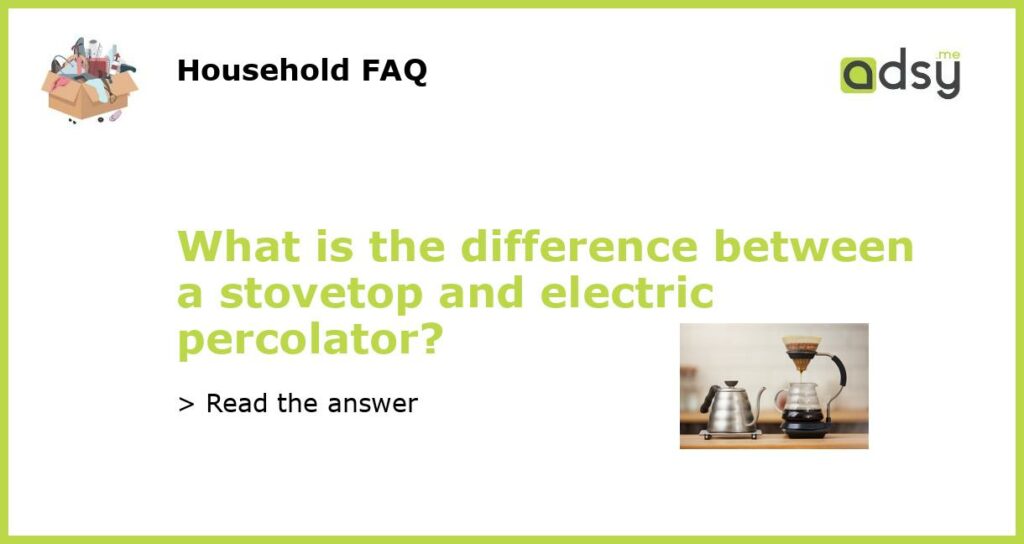The Difference Between a Stovetop and Electric Percolator
When it comes to making a delicious cup of coffee, percolators are a popular choice. However, there are two main types of percolators available on the market – stovetop percolators and electric percolators. While both options are capable of delivering a rich and flavorful cup of coffee, there are some differences between the two that are worth considering. Let’s take a closer look at the difference between a stovetop and electric percolator.
Method of Heating
The most notable difference between a stovetop and electric percolator is the method of heating. A stovetop percolator is designed to be used on a stove or open flame. The heat from the stove or flame causes the water in the percolator to boil, creating a pressure that forces the water up through a tube and over a perforated basket containing the coffee grounds. The water then drips through the coffee grounds and back down into the percolator, creating a cycle.
On the other hand, an electric percolator has its own heating element built-in. This means that you don’t need a stove or open flame to use an electric percolator. Simply plug it into an electrical outlet and the built-in heater will heat the water to the desired temperature. Electric percolators often have adjustable temperature settings to allow you to customize your brewing preferences.
Control and Convenience
Another difference between stovetop and electric percolators is the level of control and convenience they offer. Stovetop percolators require more attention and manual control during the brewing process. You need to monitor the heat level and make adjustments to maintain the ideal brewing temperature. This can be a fun and hands-on experience for those who enjoy brewing coffee as a ritual, but it can also be time-consuming and require constant supervision.
Electric percolators, on the other hand, offer more convenience and control. With adjustable temperature settings and built-in timers, they allow you to set and forget. Simply set the desired brewing temperature and time, and let the percolator do the rest. This feature makes electric percolators a popular choice for busy individuals who value convenience and consistency.
Brew Time
The brew time is another aspect that differentiates stovetop and electric percolators. Stovetop percolators generally have a longer brew time compared to electric percolators. This is because stovetop percolators rely on the heat from the stove or open flame, which may take longer to reach the desired brewing temperature.
On the other hand, electric percolators have a faster brew time. The built-in heating element allows for faster heating and shorter brewing time. This can be advantageous for those who are always on the go or don’t have the luxury of waiting for a longer brewing process.
Portability
If you are someone who enjoys camping or outdoor activities, the portability of your coffee brewing equipment is essential. In this aspect, stovetop percolators have an advantage. Stovetop percolators are often lightweight and compact, making them easy to carry and use in outdoor settings where electricity may not be readily available.
Electric percolators, on the other hand, require a power source to function. While they are portable in the sense that they can be moved around within a home or office setting, they may not be suitable for outdoor use unless you have access to electricity or a portable power source.
Price
Price is another factor that may influence your decision between a stovetop and electric percolator. In general, stovetop percolators tend to be more affordable compared to electric percolators. The simplicity of the design and lack of electrical components contribute to their lower cost. If you are on a budget or prefer a more traditional brewing method, a stovetop percolator may be the right choice for you.
On the other hand, electric percolators often come with advanced features and convenience, which can drive the price up. While they may require a higher investment upfront, they often offer more options and customization, making them a worthwhile choice for coffee enthusiasts who value convenience and control.
In conclusion, both stovetop and electric percolators have their unique advantages and considerations. The choice between the two ultimately depends on your brewing preferences, lifestyle, and budget. Whether you prefer the hands-on experience of brewing coffee on a stovetop or the convenience of an electric percolator, both options can deliver a delicious cup of coffee to satisfy your caffeine cravings.






